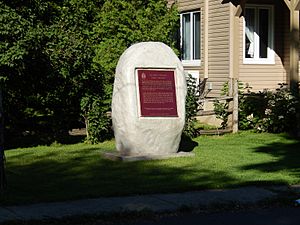Fort Crevier facts for kids
Quick facts for kids Fort Crevier |
|
|---|---|
| Pierreville, Nicolet-Yamaska, Quebec, New France, Canada | |
 |
|
| Site information | |
| Controlled by | France |
| Site history | |
| Built | 1687 |
| Battles/wars | French and Indian War |
| Official name: Fort Crevier National Historic Site of Canada | |
| Designated: | 1920 |
Fort Crevier was a French fort built in Quebec, near the Saint-François River. It played an important role in the history of New France, helping to protect the early French settlers.
Contents
What was Fort Crevier?
Fort Crevier was built in 1687 near a place called Saint-François-du-Lac. A man named Jean Crevier de Saint-François was in charge of building it. The fort was also known by another name: Fort Saint-François.
Why was it built?
The main reason for building Fort Crevier was to protect the French settlers, known as Habitants, who lived in the area. At that time, there were often conflicts with the Iroquois people. The British encouraged these attacks. The fort was a safe place for the French families and a base for soldiers.
Life and Battles at the Fort
Life at the fort was often dangerous. The Iroquois attacked Fort Crevier more than once. In November 1689, the fort faced its first major attack.
Attacks and Changes
Another big attack happened in August 1693. During this battle, Jean Crevier, who built the fort, was killed. Despite these challenges, the fort remained important for a while.
Around the year 1700, Fort Crevier became part of a larger Abenaki village. The Abenaki were another Indigenous group. The fort was no longer needed after 1701, when the fighting with the Iroquois ended. So, it was abandoned.
What happened next?
Years later, in 1759, the village that had grown around the old fort was destroyed. This happened during the French and Indian War. A group of British soldiers called Rogers' Rangers, led by Major Robert Rogers, attacked it. Many people in the village died during this attack. The area later became known as Odanak.
A Historic Place Today
Fort Crevier is remembered as an important part of Canadian history. In 1920, it was named a National Historic Site of Canada. This means it's a special place that helps us understand the past.
To honor the fort, a monument was put up. The Historic Sites and Monuments Board of Canada placed it there. It was officially shown to the public in June 1939.
 | Laphonza Butler |
 | Daisy Bates |
 | Elizabeth Piper Ensley |

